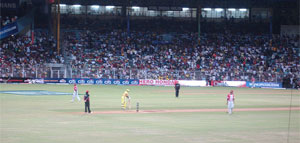Sport, nationalism, politics, business and entertainment. All are the aspects of cricket. An unfortunate addition to the list is corruption, which threatens the integrity of “the gentleman’s game”.
Like the great batsman Sachin Tendulkar corruption seems not to leave the field. Ever since the exposure of cricket legend Hansie Cronje’s involvement in match fixing in 2000, more and more incidents have occurred.
 As a cricket fan I was not surprised by the recent incident of match-fixing involving six umpires during the cricket World Cup. Though initially shocking, such incidents have now become regular and reflect the sad state of affairs in cricket. My colleague on fellow cricket fan Rukshana Nanayakkara has written about these scandals in greater length in the Sri Lankan press.
As a cricket fan I was not surprised by the recent incident of match-fixing involving six umpires during the cricket World Cup. Though initially shocking, such incidents have now become regular and reflect the sad state of affairs in cricket. My colleague on fellow cricket fan Rukshana Nanayakkara has written about these scandals in greater length in the Sri Lankan press.
According to the sport’s governing body, the International Cricket Council (ICC), corruption is mainly driven by a vast, illegal and mafia-run gambling industry; around $50 billion of illegal bets are placed on cricket matches each year.
An Indian TV investigation conducted ahead of the world cup revealed video clips in which umpires were allegedly shown to be willing to give certain decisions and disclose important information in exchange for money.
While the ICC probes the matter it was clarified that none of the umpires named were part of any official game in the world cup. However, there is a deeper issue for the sport: the growth in commercialization of cricket, which has created more scope for, and increased the dimensions of, corruption.
Cricket’s changing format, the greater involvement of private sector stakeholders and technological development have all increased the threats of corruption, in the forms of online gambling and spot fixing, when some players fix certain parts of the game, not the entire match.
Involvement of players in match fixing during the 2012 Indian Premier League and Pakistan spot fixing scandal in 2010 were other recent incidents which confirmed that apparent need for more transparency in the operation of the cricketing activities is awaited.
An evident gap is the lack of guidelines and procedures for dealing with corruption allegations in cricket. Nor are there enforceable penalties for those found guilty.
Sometimes cricketers are dealt with heavily, like the case of three Pakistani cricketers who received jail sentences in a British criminal court in November 2011 for their involvement in spot fixing. However the overall system lacks accountability, operating as it is without any set of rules or guidelines.
This despite the fact that Transparency International has proposed 20 recommendations for reform.
A joint effort of ICC, cricket boards in different countries and local laws are necessary to stop the external mediators influencing the game.
Corruption is poses a big threat to the integrity of the gentlemen’s game and strongly affects the attachment we the fans feel with it. The ICC is making efforts to fight corruption in the game; nevertheless there is a need for more definite and visible steps so as not to disappoint the millions of cricket fans, including me, who expect a fair play.















 Connect with us on Facebook
Connect with us on Facebook Follow us on Twitter
Follow us on Twitter